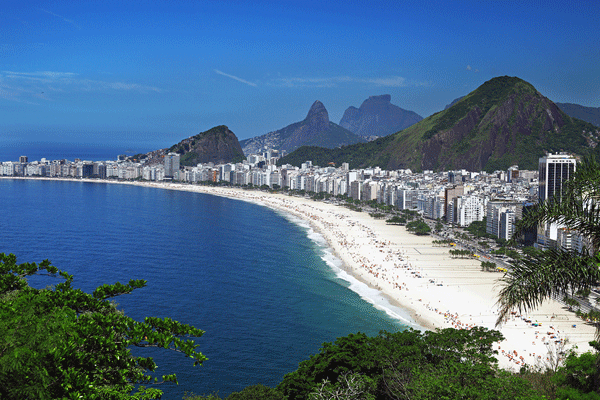10 Things to Know Before Moving to Brazil
Summary: If you're planning a move to Brazil, here are 10 things expats living there wish they had known before moving to Brazil.

Are you considering a move to the vibrant and diverse nation of Brazil? With its rich culture, stunning landscapes, and dynamic cities, it's no wonder that Brazil is a popular destination for expatriates from around the globe. However, before you pack your bags and say "Adeus" to your home country, there are some essential things you should know to ensure a smooth transition. From understanding the local customs to navigating the legalities of residency, here are ten crucial tips to help you prepare for your Brazilian adventure.
1. Embrace the Brazilian Lifestyle
Adjusting to the Brazilian way of life is key to enjoying your time in this South American gem. Brazilians are known for their warm hospitality and a laid-back attitude towards life, often referred to as 'jeitinho brasileiro'. This concept encompasses flexibility, resourcefulness, and the ability to navigate through complex situations with ease and charm. As an expat, embracing this mindset will help you integrate into the community and understand the local customs and social nuances. For example, don't be surprised if a business meeting turns into a friendly chat over coffee, as personal relationships are highly valued in Brazil.
2. Learn Portuguese
While you may find English speakers in tourist areas and larger cities, Portuguese is the lingua franca of Brazil. Learning the language will not only make daily life more manageable but also enrich your cultural experience. Many expats have found that even basic Portuguese skills can open doors to new friendships and opportunities. Language schools and private tutors are widely available, and immersing yourself in the local culture is a fantastic way to practice. Remember, Brazilians appreciate any effort to speak their language, so don't be shy to try!
3. Understand the Visa Requirements
Before moving to Brazil, it's crucial to familiarize yourself with the visa and residency requirements. Brazil offers various visas, including work, student, and retirement visas, each with its own set of criteria and documentation. For instance, obtaining a permanent visa may require proof of employment or investment in Brazil. It's advisable to consult with the Brazilian consulate or an immigration lawyer to ensure you have the correct documentation and to understand the process of becoming a legal resident.
4. Get Ready for a Diverse Climate
Brazil's vast size means it boasts a wide range of climates, from the tropical Amazon rainforest to the temperate regions in the south. Depending on where you choose to live, you'll need to prepare for the local weather conditions. In cities like Manaus, located in the heart of the Amazon, expect high humidity and rainfall. Conversely, if you're moving to São Paulo, you'll experience a more moderate climate with distinct seasons. Researching your destination's climate will help you pack appropriately and adjust your lifestyle accordingly.
5. Prepare for the Cost of Living
The cost of living in Brazil can vary significantly depending on the city and your lifestyle. While some expats find living in Brazil more affordable than their home countries, others may find certain expenses, such as imported goods and private healthcare, to be higher. It's essential to create a budget that accounts for housing, food, transportation, and entertainment. For example, living in Rio de Janeiro or São Paulo might be more expensive than in smaller cities or towns. Plan your finances carefully to enjoy a comfortable life in Brazil.
6. Navigate the Healthcare System
Brazil has a public healthcare system known as SUS (Sistema Único de Saúde), which provides free healthcare services to residents, including expats with permanent visas. However, the quality of public healthcare can vary, and many expats opt for private health insurance to access better facilities and shorter wait times. Researching and investing in a comprehensive health plan will give you peace of mind and ensure you receive the care you need when you need it.
7. Safety and Security
Like any country, Brazil has areas that are safer than others. It's important to be aware of your surroundings and take precautions to protect yourself and your belongings. In some cities, petty crime such as pickpocketing and theft can be common, so it's wise to avoid displaying valuables and to be cautious when using ATMs. Joining expat communities and forums can provide valuable insights into the safest neighborhoods and practical safety tips from those who have already navigated these challenges.
8. Embrace the Festive Culture
Brazil is synonymous with festivals, and none is more famous than the annual Carnival. This exuberant celebration is a highlight for many expats, offering a chance to experience the country's passion for music, dance, and pageantry. Beyond Carnival, there are numerous local festivals and cultural events throughout the year that showcase Brazil's diverse heritage. Participating in these festivities is a fantastic way to connect with the local culture and make lasting memories.
9. Understand the Real Estate Market
Finding the right home in Brazil can be a challenge, especially for newcomers unfamiliar with the local real estate market. Renting is a common choice for expats, and it's advisable to work with a reputable real estate agent who can guide you through the process. Be prepared for rental agreements to be in Portuguese and to require a Brazilian guarantor or additional deposit. Take the time to explore different neighborhoods and understand the amenities and transport links to find the perfect place to call home.
10. Transportation and Getting Around
Transportation options in Brazil are as varied as the country itself. In large cities, public transport networks are often extensive, including buses, metro systems, and taxis. However, traffic congestion can be a significant issue, so many expats choose to live close to work or school to minimize commute times. If you plan to drive, be aware that traffic laws and driving styles may differ from what you're used to, and obtaining a Brazilian driver's license will be necessary. Alternatively, many expats find that using ride-sharing apps or cycling can be convenient and cost-effective ways to navigate the urban landscape.
Moving to Brazil is an exciting prospect that promises a wealth of new experiences and adventures. By keeping these ten tips in mind, you'll be well-prepared to start your new life in this beautiful and diverse country. Boa sorte (good luck) on your Brazilian journey!
Expats talk about Moving to Brazil
"I am sorry to say that after 14 years in Brazil my advise would be don't move, please reconsider. As my dentist (Brazilian) recently said, "Sao Paulo is a cruel city". I hear his comments with a heavy heart. I have grown to love Brazil but the prices, lack of infrastructure, noise, traffic and now protests and violence have taken their toll," said one expat living in Sao Paulo.
"The south of Brazil is completely different. I lived in Balneário camboriu for one year and I loved it so much that I decided not to live in Europe and I will live down the south of Brazil. We might live in Balneário camboriu or Floripa or another city. We work online so we can move around until we decide. I can go for walks on my own at night at 9pm, 10pm, 11pm and there's lots of people around. Santa Cararina in general is an amazing place. A lot cheaper than Europe and the US and the conversion rate is better for us right now," wrote a member in Brazil.
"Do lots of research as it is available on line. Include in your research a local attorney who speaks English and is a member of either Briton's legal Bar Association or the ABA in the States. It is always nice when the local attorney is licensed in one of those countries because unethical practices could get them barred. With their membership in one of the Bar Associations there should be available info on whether any complaints have been filed against them in the past. These local attorneys act very much like the Title companies in the States. They do all the research to ensure free and clear property and titles. Make sure that you visit the area and the home to ensure it is what you hoped it to be. I would also recommend staying at least 2 weeks and spend time knowing the area. THE MOVE: Moving from the UK or USA is probably not a big deal. However, to get your household goods into Brazil.....well that's another matter. For instance, the USA moving company needs a 3rd party in Brazil to facilitate receiving your container and moving it to your new home. They will need paperwork that to us seems highly unusual and bureaucratic. Brazil is after all a highly bureaucratic place to live and if you haven't lived here then your in for a surprise. One of the documents that I needed was my original boarding pass from the airline that I flew from Miami to Recife. The 3rd party Brazilian company stated that without the boarding pass to prove how I arrived in Brazil then the container could not be received in Brazil (my federally stamped passport and my federally stamped Entry Card does not count). The boarding pass along with a number of other paperwork had to be notarized at one of the local Cartarios and returned to the 3rd party company. It will require several hours of standing in line to get 5 minutes of work completed. If your moving to Brazil this is how they do things and all the complaining from me or you will not change it. With all this said, I will say now that after all the standing in line waiting, jumping through hoops and getting mad, after returning home to our villa and seeing the sunset from our roof top........PRICELESS," commented one expat who made the move to Praia de Pipa.
"Brazil is a very big country, with many beautiful places, all having their advantages and disadvantage. Violence and lack of infrastructure are very common in many big cities. If you are looking for someone safe and well developed, move to Santa Catarina. Florianópolis, Camboriu, Itapema, Porto Belo for example are fantastic places to live. They feel more European, it's safe to live there and the infrastructure is good. Get in contact if I can do more to help," remarked one expat living in Brazil.
About the Author
 Joshua Wood, LPC joined Expat Exchange in 2000 and serves as one of its Co-Presidents. He is also one of the Founders of Digital Nomad Exchange. Prior to Expat Exchange, Joshua worked for NBC Cable (MSNBC and CNBC
Primetime). Joshua has a BA from Syracuse and a Master's in Clinical and Counseling Psychology from Fairleigh Dickinson University. Mr. Wood is also a licensed counselor and psychotherapist.
Joshua Wood, LPC joined Expat Exchange in 2000 and serves as one of its Co-Presidents. He is also one of the Founders of Digital Nomad Exchange. Prior to Expat Exchange, Joshua worked for NBC Cable (MSNBC and CNBC
Primetime). Joshua has a BA from Syracuse and a Master's in Clinical and Counseling Psychology from Fairleigh Dickinson University. Mr. Wood is also a licensed counselor and psychotherapist.
Some of Joshua's articles include Pros and Cons of Living in Portugal, 10 Best Places to Live in Ireland and Pros and Cons of Living in Uruguay. Connect with Joshua on LinkedIn.
Additional Information:
- Brazil Guide
- Healthcare & Health Insurance in Brazil
- Members Talk about Healthcare & Health Insurance in Brazil
- Best Places to Live in Brazil
- Real Estate in Brazil
- Guide to Real Estate in Brazil
- Pros & Cons of Living in Brazil
- Cost of Living in Brazil
- Christmas in Brazil
- Dengue Virus in Brazil
- Culture Shock in Brazil
- Homeschooling in Brazil
- 2025 Guide to Living in Brazil
- Pros and Cons of Living in Brazil 2025




